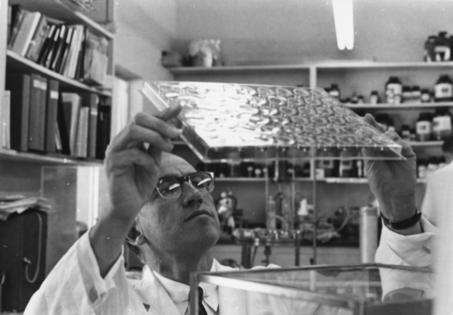Commentary: What would Jonas Salk say if he could see us now?
Published in Op Eds
The cheers that greeted State Surgeon General Joseph Ladopo’s announcement that Florida would become the first state to end vaccine mandates reminded us of a moment captured on film 70 years ago when Dr. Thomas Francis announced to a waiting nation that Dr. Jonas Salk’s polio vaccine had been found to be “safe, effective and potent.”
Julius Youngner, the Salk Lab’s senior scientist, remembered that spring day in Ann Arbor, Michigan: “Kids ran out into the streets, factory whistles went off, church bells tolled, people were crying. It was as if a war had ended.” Salk’s team needed no reminders that the disease they’d battled for six years injured and killed tens of thousands of children every year. Their lab at the University of Pittsburgh was in the former morgue of the city’s Municipal Hospital; the polio ward was located just a few stories above.
In 2013, we were asked to produce and direct a documentary, “A Shot to Save the World,” about Salk’s remarkable achievement. We interviewed over three dozen people who knew Salk, including all the surviving members of his lab, adults who as children had participated in the trials and two of his sons, Drs. Peter and Jonathan Salk. The film premiered on the Smithsonian Channel on Oct. 24, World Polio Day, and was rereleased on Paramount+ during Operation Warp Speed.
Salk’s story inspired our latest film: “Virulent: The Vaccine War” about vaccine hesitancy, which we began filming two months before COVID-19 struck. We are not scientists. We are not doctors. But as storytellers, we could not help wondering: How did we get here?
Today’s war, waged by Ladopo and members of the Trump administration, most prominently HHS Secretary Robert F. Kennedy, Jr., is against public health and proven science. Ladopo, a Harvard Medical School graduate, knows better. So does Mehmet Oz, the celebrity doctor who oversees Medicaid and Medicare, who told Fox News, “Parents love their kids more than anybody else, so why not let [them] play an active role in this?” conflating parental love with expertise in infectious disease transmission. Watching this, we asked ourselves a second question: What would Jonas Salk make of today’s dangerous assault on vaccines?
By the early 1950s, rolling polio epidemics claimed 50,000 children a year. It came every summer, like a biblical plague. It killed some children and paralyzed and maimed others, leaving vivid reminders, young victims in wheelchairs, leg braces and iron lungs.
In 1952, Salk began testing his experimental vaccine on children who already had polio to see if it would boost their antibodies. His theory proved correct, and he moved on to testing the vaccine in healthy children. He also tested it on himself and his sons. The national field trial that followed was the largest in medical history. Contrary to claims by those who oppose vaccine mandates, Salk’s vaccine was thoroughly tested. Over 1.6 million children participated in a double-blind, placebo-controlled study. (Salk struggled with the decision to give 200,000 children a placebo in the middle of what he knew was a yearly polio epidemic.)
On April 12, 1955, after Francis announced the results of the trial, America celebrated and Salk became a national hero. He was awarded the Congressional Medal of Freedom. President Eisenhower invited him to the White House and broke down. “I just don’t have the words to thank you,” said Eisenhower, by then a grandfather. Within a generation, the disease was eradicated in the United States. (But Salk never forgot the children in the placebo group who helped prove the vaccine worked; 16 died from polio during the trial and 36 were permanently paralyzed.) Salk refused to profit from his vaccine, famously telling newsman Edward R. Murrow, “There is no patent. Could you patent the sun?” His vaccine was science’s gift to the people.
Sadly, times have changed. After Ladopo’s announcement in which he compared vaccine mandates to slavery, Gov. Ron DeSantis unironically declared, “I don’t think any state has ever come close to what Florida has done.” DeSantis was referring to the liberty argument often put forth by anti-vaxxers. With freedom of choice trumping science, we can only hope that the number of children who succumb to preventable infectious diseases doesn’t revert to numbers not seen in decades.
Arthur Caplan, an NYU medical ethicist, says that the liberty argument breaks down given that vaccines are proven to prevent the spread of disease. “I should help protect my vulnerable neighbors. You can’t have a flourishing society unless you have community interests that get advanced by citizens,” he said. “If we don’t do that, it’s up to you to build your own roads, raise your own army. That kind of libertarianism is just wrong, and that’s where you have to call out the ethics.” Jonas Salk would have agreed.
____
Laura Davis and Tjardus Greidanus produce and direct documentaries about science and medicine.
___
©2025 South Florida Sun Sentinel. Visit at sun-sentinel.com. Distributed by Tribune Content Agency, LLC.
























































Comments